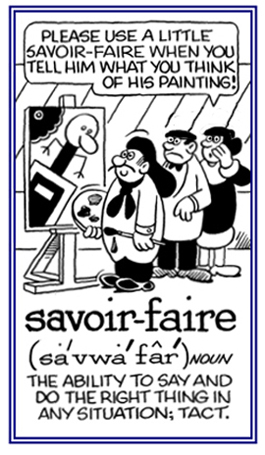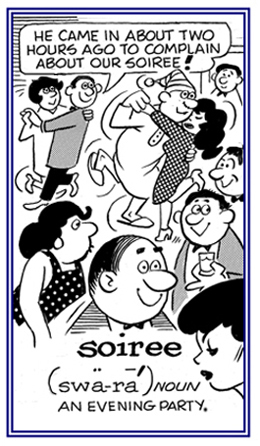Words of French origin
(Many words from French are used in English)
recruit (verb), recruits; recruited; recruiting
To invite or encourage an individual to sign up for a particular job: Mr. Thomas recruited thirteen trained workers for the harvest season on the farm.
A signal or sound to alert individuals of the time of day for getting up: Johnathan heard the reveille and longed to ignore it and go back to sleep.
A musical variety show featuring dance, song, and commentary about current events: Uncle Horace enjoyed attending the revues in which his niece, Helen, performed as a vocalist.
risqué, risque (adjective); more risqué, more risque; most risqué, most risque
1. Referring to unacceptable or immoral presentations: The nightclub woman was singing a song with risqué lyrics.
2. Suggestive of or bordering on impropriety or indecency: When Andrew was telling his girlfriend a risqué story, she did not appreciate it and she told him never to do it again.
3. Etymology: from French risqué, a reference to "being indecent or unacceptable"; from risquer, "to risk."

© ALL rights are reserved.

© ALL rights are reserved.
Go to this Word A Day Revisited Index
2. Suggestive of or bordering on impropriety or indecency: When Andrew was telling his girlfriend a risqué story, she did not appreciate it and she told him never to do it again.
3. Etymology: from French risqué, a reference to "being indecent or unacceptable"; from risquer, "to risk."


Go to this Word A Day Revisited Index
so you can see more of Mickey Bach's cartoons.
A style of art found in furniture design, music, and architecture and is characterised by elaborate ornamentation and flourishes: The rococo noted in European churches often included beautifully painted ceilings.
1. The part played by an actor in a stage or filmed performance: Hector Long was famous for the roles he created on stage that required swashbuckling sword work.
2. The function or purpose of an object or tool: The significant role of the computer in everyday life has been recognised by research projects.
2. The function or purpose of an object or tool: The significant role of the computer in everyday life has been recognised by research projects.
1. Malicious destruction, ruin, and disruptions that are deliberately caused, typically involving groups in conflict with each other: The enemy agent was arrested on charges of sabotage.
2. The act or process of deliberately destroying or damaging something so it doesn't work any more: Investigating officials have not ruled out sabotage as the cause of the crash of the passenger plane.
3. Etymology: from French saboter, "to produce poorly."
2. The act or process of deliberately destroying or damaging something so it doesn't work any more: Investigating officials have not ruled out sabotage as the cause of the crash of the passenger plane.
3. Etymology: from French saboter, "to produce poorly."
sabotage (verb), sabotages; sabotaged; sabotaging
1. To incapacitate, to undermine, to destroy, or to subvert: The bad weather sabotaged Larry's vacation plans for the summer.

© ALL rights are reserved.
Go to this Word A Day Revisited Index
Frank is determined to sabotage a business deal because it would have resulted in the loss of too many jobs at his company.
2. Etymology: from French saboter, "to execute poorly."
Go to this Word A Day Revisited Index
so you can see more of Mickey Bach's cartoons.
A person or people who deliberately destroy or damage something: Saboteurs were going around breaking shop windows.
A saboteur was hacking into the bank's computers and making it impossible for people to conduct business with the bank.
The tires on the car were slashed by a saboteur or saboteurs.
1. Knowledge of life in the world and the ways or usages of polite society.
2. A combination of worldly wisdom, self-confidence, and good social manners: Margaret's Aunt Karen is an inspiration for others because she lives her life with incredible savoir vivre."
3. Etymology: from French, savoir "to know" + vivre "to live."
2. A combination of worldly wisdom, self-confidence, and good social manners: Margaret's Aunt Karen is an inspiration for others because she lives her life with incredible savoir vivre."
3. Etymology: from French, savoir "to know" + vivre "to live."
1. The ability to know how to act or what to say, and do the correct thing in any situation; social adeptness: Linda enjoyed being with her friend Grace because she possessed the quality of savour-faire in that she was very considerate of others and was also very tactful.
2. Etymology: from French savoir, "to know" + faire, "to do."

© ALL rights are reserved.
Go to this Word A Day Revisited Index
2. Etymology: from French savoir, "to know" + faire, "to do."

Go to this Word A Day Revisited Index
so you can see more of Mickey Bach's cartoons.
soi-disant (adjective) (not comparable)
1. Self-proclaimed: The soi-disant term is used to say that someone claims to be something even when that person's assertion is not valid.

© ALL rights are reserved.
Go to this Word A Day Revisited Index
Greg maintains that he has a "PhD" degree which is a soi-disant declaration because he has no advanced education of any kind.
If someone refers to himself or herself as a medical doctor, even though he or she never actually trained to be a physician, then that person is a soi-disant or false M.D.
2. Etymology: from French soi, "one's self" + disant, "saying, to say".
Go to this Word A Day Revisited Index
so you can see more of Mickey Bach's cartoons.
soigné, soigne (adjective) (not comparable)
1. A reference to a person who is dressed very elegantly and well groomed: The soigné celebrity was shown on television as he was getting into his limousine, or luxury vehicle, and was being driven away by a chauffeur.
2. Relating to the condition of being elegantly maintained or designed: Adam and his wife Eve went to a fancy soigné restaurant to celebrate her birthday.
3. Descriptive of something that is carefully made and well produced: The soigné wedding for Johnathan and Pamela and their guests, who attended the extravagant wedding, were all dressed in very stylish clothing and being entertained with beautiful music.
4. Etymology: from French soigné, from soigner "to take care of."

© ALL rights are reserved.
Go to this Word A Day Revisited Index
2. Relating to the condition of being elegantly maintained or designed: Adam and his wife Eve went to a fancy soigné restaurant to celebrate her birthday.
3. Descriptive of something that is carefully made and well produced: The soigné wedding for Johnathan and Pamela and their guests, who attended the extravagant wedding, were all dressed in very stylish clothing and being entertained with beautiful music.
4. Etymology: from French soigné, from soigner "to take care of."

Go to this Word A Day Revisited Index
so you can see more of Mickey Bach's cartoons.
1. An evening party, which is normally in a private home, for friendly discussions and music or for some other special reason: After having thanked Anna and Jack for their wonderful soiree that evening, the guests started to leave and to go home.
2. People pretending to be of a higher class than others: One attendee, an attractive young woman, passionately defended the soiree as a way to connect with the very wealthy and influential people who were also there.
3. Etymology: from French soir, "evening".

© ALL rights are reserved.
Go to this Word A Day Revisited Index
2. People pretending to be of a higher class than others: One attendee, an attractive young woman, passionately defended the soiree as a way to connect with the very wealthy and influential people who were also there.
3. Etymology: from French soir, "evening".

Go to this Word A Day Revisited Index
so you can see more of Mickey Bach's cartoons.
1. A short excursion to someplace and back again: For their graduation party, the high school students planned a sortie to the local theme park.
2. An attack made by a military force when it departs briefly from its own position: The soldiers made a sortie into the enemy's territory, but not a single prisoner was taken.
2. An attack made by a military force when it departs briefly from its own position: The soldiers made a sortie into the enemy's territory, but not a single prisoner was taken.


